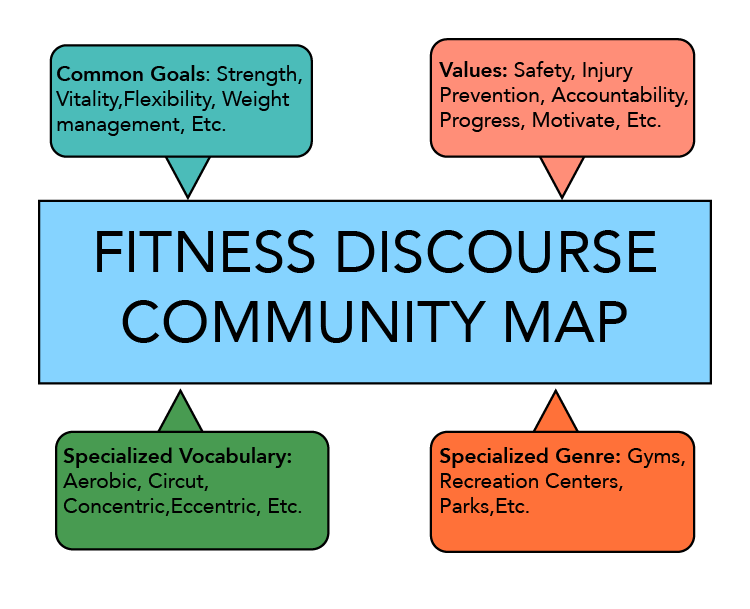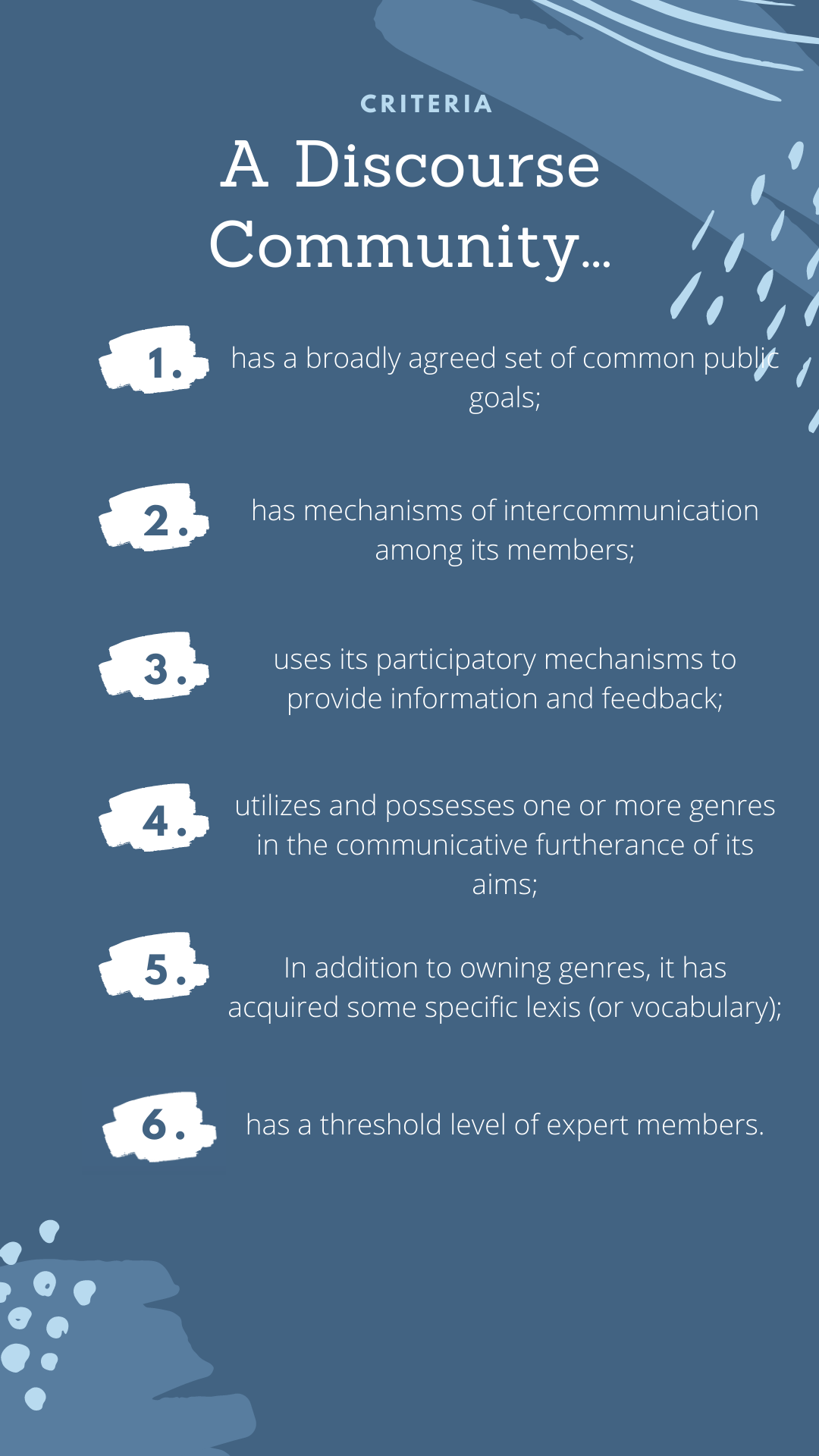Discourse Communities and Conventions
A discourse community is a group of people who share a set of discourses, understood as basic values and assumptions, and ways of communicating their goals. In the academic world, discourse communities are usually defined by field and subfield. That means that the discourse community of geology represents the common scholarly conversation that takes place among geologists. If an audiologist entered into their conversation (or picked up one of their journals), it’s likely that many of the terms and concepts would be unfamiliar, and a geologist would have the same problems in a conversation about audiology. Getting a grasp on your academic discourse community and its conventions is the first step to becoming a successful college student.
When you interact with your classmates in your English class and learn the language of writing processes, for example, determining your rhetorical situation, you are participating in a specific discourse community. In the discourse community of your freshman English class, participants include an instructor, you, your classmates, and your college.
Associate Professor Dan Melzer writes about his experience as a beginning college student in his essay “Understanding Discourse Communities.” He writes:
When I was an undergraduate at the University of Florida, I didn’t understand that each academic discipline I took courses in to complete the requirements of my degree (history, philosophy, biology, math, political science, sociology, English) was a different discourse community. Each of these academic fields had their own goals, their own genres, their own writing conventions, their own formats for citing sources, and their own expectations for writing style. I thought each of the teachers I encountered in my undergraduate career just had their own personal preferences that all felt pretty random to me. I didn’t understand that each teacher was trying to act as a representative of the discourse community of their field. I was a new member of their discourse communities, and they were introducing me to the genres and conventions of their disciplines. Unfortunately, teachers are so used to the conventions of their discourse communities that they sometimes don’t explain to students the reasons behind the writing conventions of their discourse communities
Discourse communities exist in more than just academic situations. Imagine that you make a New Year’s resolution to become healthier. You make a goal to start exercising more every week. You first choose the genre of exercise, and you debate whether to begin being active at a park, through a sports team at a recreation center, or with the help of experts at a gym.
You decide to join a gym and consult with a personal trainer who uses specialized vocabulary to describe different types of exercise: aerobic, anaerobic, reps, plyometrics, and isometrics. You discover other gym members who share that same goal of becoming healthier, more flexible, and stronger. You become versed in a new language of fitness.
The figure down below illustrates a fitness discourse community.

KEY TAKEAWAYS
A discourse community:
- has a broadly agreed set of common public goals as well as shares certain values and beliefs that define the community;
- has a threshold level of members with a suitable degree of expertise in content that is relevant to the community; and
- communicates information and feedback among its members using specialized vocabulary and/or genres.
Linguist John Swales defined discourse communities as “groups that have goals and purposes, and use communication to achieve their goals.” Swales uses six criteria to determine whether a specific community is in fact a discourse community.

Criteria for a Discourse Community
In College Writing and Beyond: A New Framework for University Writing Instruction, Anne Beaufort provides us with a succinct definition of a discourse community: “a social group that communicates at least in part via written texts and shares common goals, values, and writing standards, a specialized vocabulary and specialized genres.” Just as discourse communities have specialized vocabularies and standards, different discourse communities pursue different kinds of questions.
Let’s take a big problem like global climate change and focus on Alaska. An environmental scientist, a pathologist, an economist, and an anthropologist would raise different kinds of questions about the same problem. The environmental scientist would ask questions like: how much has the water risen since we last checked? How have the increasing temperatures and rising water levels affected the vegetation and animal life? A pathologist would take a different approach: what new diseases have emerged in correlation with global climate change? Economists would ask how global climate change is affecting the economic situation in Alaska. How has the lumber or the fishing industry been affected by global climate change? How has global climate change affected tourism? An anthropologist might ask how global climate change is affecting the ways of life of certain indigenous groups.
Knowing How Discourse Communities Work
Because questions vary significantly from discipline to discipline and from field to field, it is important that you assess your questions according to the discourse community you are writing within. Once you’ve selected a major, one way to develop a sense of the types of questions posed in your selected discipline is to read articles published in that field. For example, read a few articles published in the field and identify the questions these articles raise at the beginning of the texts. Of course, these questions are not always explicitly stated, so identifying an article’s motivating questions might take some work. Write the questions out, make a list of defining characteristics, and assess your own questions next to this list. Also, pay attention to the types of questions your teacher poses either in assignments or in class. These are the kinds of questions you should be asking when you start to develop your own writing projects for this course.
Melzer writes about the importance of understanding discourse communities, so that students can effectively meet the expectations of their courses:
[Understanding] the ways that genres perform social actions in discourse communities can help you better understand where your college teachers are coming from in their writing assignments and also help you understand why there are different writing expectations and genres for different classes in different fields. Researchers who study college writing have discovered that most students struggle with writing when they first enter the discourse community of their chosen major….When you graduate college and start your first job, you will probably also find yourself struggling a bit with trying to learn the writing conventions of the discourse community of your workplace. Knowing how discourse communities work will not only help you as you navigate the writing assigned in different general education courses and the specialized writing of your chosen major, but it will also help you in your life after college. Whether you work as a scientist in a lab or a lawyer for a firm or a nurse in a hospital, you will need to become a member of a discourse community. You’ll need to learn to communicate effectively using the genres of the discourse community of your workplace, and this might mean asking questions of more experienced discourse community members, analyzing models of the types of genres you’re expected to use to communicate, and thinking about the most effective style, tone, format, and structure for your audience and purpose. Some workplaces have guidelines for how to write in the genres of the discourse community, and some workplaces will initiate you to their genres by trial and error. But hopefully now that you’ve read this essay, you’ll have a better idea of what kinds of questions to ask to help you become an effective communicator in a new discourse community.
A Discourse Community in Action
In the excerpt above, Professor Melzer writes that in order to become a member of a discourse community, prospective members will “need to learn to communicate effectively using the genres of the discourse community” and he references working as a scientist in a lab, or a lawyer in a firm, or a nurse in a hospital.
The restaurant industry is a discourse community with its own language, goals, members, experts, and specialized vocabulary.
The following videos analyzes the discourse community that evolved out of a local pizza place, Dion’s.
Adapted from
- Discourse Communities and Conventions from Lumen Learning https://courses.lumenlearning.com/olemiss-writ250/chapter/discourse-communities-visiting-a-new-grove-tent/, licensed CC BY-SA: Attribution-ShareAlike
- Melzer, Dan. Writing Spaces: Readings on Writing, Volume 3, Parlor Press, 2020. https://writingspaces.org/sites/default/files/melzer-understanding-discourse-communities.pdf